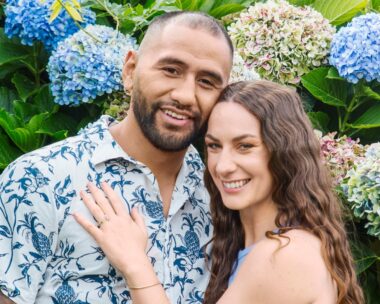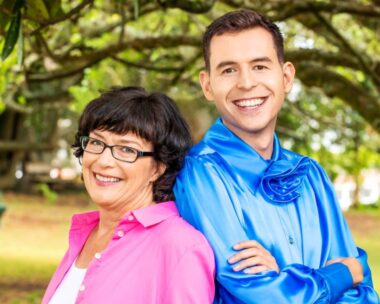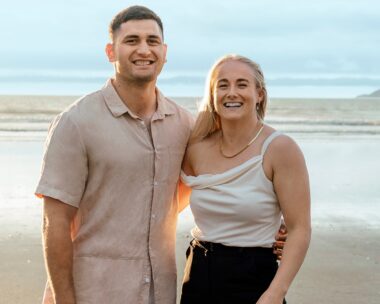I’ve always been a bit prudirsh. Not prissy, not puritanical – I’m no Victorian lady – but just a little restrained.
Certainly I’m not an obvious candidate for a Tantra workshop. But as a member of the Ace Lady Network, a women’s discussion group that holds monthly events, I sign up for ‘Touch that feels like WOW: a Tantra-inspired workshop’.
I don’t know much about Tantra beyond biomechanically improbable sexual contortions, and rumoured salacious accounts of Sting’s seven-hour Tantric-sex sessions, but this has been advertised as a ‘PG, non-seedy’ workshop. And as the tired mother of a toddler, I could probably do with some inspiration in this department.
Arriving at the workshop, I find facilitator Caitlyn Cook sitting cross-legged in a maxi dress, legs unshaved, exuding calmness. The 28-year-old Kiwi, now based in Melbourne, has flown into her former haunt Wellington especially for the occasion.
Twenty women trickle in, many looking a little alternative, and some looking a little nervous. We each claim a spot in a circle of cushions. As I glance around the room, I start to think twice about signing up for this. Will it be weird? Uncomfortable? Embarrassing?
When we start, Cook asks us to each say our name, how we’re feeling right now, and what we want to get out of the evening. Some women admit to nerves, and Cook reassures us.
“Sometimes people are afraid of things they might have to do, but this is far more simple and relaxing.”
It is, she says, as much about verbal and non-verbal communication as it is the power of touch.
The first exercise is about connecting with your authentic desire. After leading a meditation, Cook asks us to form pairs, lock eyes with the other person, and ask whether we can touch her in some way: for example, massage her hand or brush her hair. It’s all hypothetical (if she says yes, you don’t actually do it).
“We’re tuning into our inner no and our inner ‘F–k yes’,” Cook says. “Or heck yes, if you prefer that.”
I’m surprisingly self-conscious, even though my partner must know I don’t really want to stroke her leg. As usual, I feel compelled to defuse my awkwardness with humour.
“Can I trim your toenails? Can we waltz?”
The next exercise is called ‘Tell me what you want, what you really, really want’. Forming different pairs, we ask our partner how she’d like to be touched between her elbow and hand.
Most of us opt for arm or hand massages, following Cook’s prompts to ask and answer how it could feel even better. Then, forming another pair, we do an exercise called Expand Your Touch Repertoire, where we change our massage technique according to Captain Planet’s five elements: air, water, fire, earth and heart. Most of us opt for shoulder massages (less uncomfortable eye contact).
Cook creates a calming space through-out, clarifying everything while never intruding too much, making sure people feel comfortable, and cracking the occasional joke.
Over the two hours I feel progressively less awkward, and my inner critic quietens down. By the end, many women are smiling, and each chooses a word for how she feels now. ‘Nervous’ and ‘anxious’ have given way to ‘playful’, ‘experimental’, ‘hopeful’, ‘aware’, ‘confident’, and ‘inspired’.
Cook visibly glows on hearing this. “I’m in awe of you women.”
This ancient Eastern spiritual practice is difficult to define, but Tantra is often described as a way of life and a spiritual path that can lead to personal transformation and enlightenment.

“Everything is an opportunity to connect deeply, lovingly and authentically with the sacredness of existence through avenues including yoga, prayer, sexuality, service and communication,” explains Cook, who considers herself spiritual, not religious.
“That Tantra includes sexuality as a sacred path to deeper connection with yourself, others and the universe is pretty revolutionary, especially in the West where typically sexuality and spirituality don’t mix. For this reason, and others, the sexuality side of Tantra has been emphasised in the West.”
When it comes to sex, Tantra is less about the destination and more about the journey: mindful breathing, touching, and giving and receiving pleasure. It’s also about communicating more often and more clearly.
“Like having the guts to say ‘a bit to the left’ or ‘a bit harder’,” Cook says.
But Tantra extends well beyond the bedroom.
“It’s really about unlearning the unhelpful things that keep you contained, and connecting with your authenticity, not operating on ‘should’ principles. It’s about becoming more yourself – and letting go of what’s not you – in your body, bedroom, and life.”
And Cook helps people do just that.
The former Ministry of Justice policy analyst and occasional actor juggles a part-time marketing job with running introductory, Tantra-inspired mindfulness and sexuality workshops around Australia and New Zealand.
As well as the ‘Touch like WOW’ workshop I attended, there’s ‘WTF is Tantra? An Introduction to Mindfulness and Sexuality’; ‘Tantric Touch Meditation’;‘Expanding Your Repertoire: More Play, Fun and Dynamism’; and ‘Giving & Receiving Real Good’. And no, none involves anything sexual.
Known for their inclusiveness, her workshops usually draw as many men as women; some attend as individuals, some in couples, some with friends.
Cook, who blogs at caitlyncook.com, also holds personalised sessions with both individuals and couples, mainly in person and also over Skype.
“These sessions are a bit like the workshops but designed around what you want to explore, at your pace and comfort levels. Sessions involve lots of discussion, and practices like visualisation, breath work, sound and movement, emotional-release practices, and sense-based meditation.”
There might be sexual energy, but there’s never any sex or intimate touching.
“That’s homework. Or better said, homeplay.”
Cook’s very open about her life, but careful not to disclose too much about her boyfriend of two years – and careful about how her work is portrayed.

“I’ve been wrongly described as a sex practitioner. To be clear, I don’t practise sex with people.”
That misconception is why she considered not using the word Tantra to describe what she does.
“But Tantra’s such a big part of my work – and it’s about much more than just sex and intimacy.”
When she talks to her Christian family about her work, she focuses on its personal-development aspects.
At age nine, Cook moved from South Africa to Auckland’s North Shore with her family.
“In my early teens, I went a bit wild. I wanted to do things I had seen grown-ups do in movies: look cool, drive cars, go to parties, have romances. I was young, a bit clueless and adventurous. Unfortunately, I didn’t have the guidance, tools or awareness to genuinely enjoy myself and look after myself.”
After getting in trouble at school, she joined C3 church for three years in her late teens.
“I knew I could find love and acceptance in religion.”
Following high school and one semester of university, she spent six months as an au pair in London.
“I was questioning and assessing my place in Christianity, and discovered I could follow my own internal knowledge rather than a book [The Bible] with rules I was finding increasingly restrictive and not ‘me’. I swung from very Christian to super-atheist, which also didn’t work for me. The moment I stopped being Christian was the moment I started disordered eating, like I broke up with God and tried to find some control.”
Between ages 19 and 23, she experienced snowballing anxiety, depression and disordered eating, which included aspects of anorexia and bulimia but didn’t fit neatly into a box.
“I was 45kg and had strict KPIs [key performance indicators] on my thighs, arms and belly, and to be anywhere outside that was very scary because people wouldn’t find me attractive, exceptional, whatever. Now I feel very comfortable with however my body is, but back then looking like this would have freaked me completely out. This much mass just wasn’t okay. I also felt embarrassed because I was too feminist to fall into the disordered-eating trap.”
Her anxiety spiralled.
“I started having anxiety about having anxiety, and beating myself up about it. Sometimes I was too anxious to go to work or socialise, because I didn’t want my body seen in public, even around my friends.”
She also had intimacy issues.
“With my body shame and performance anxiety, intimacy was such an awkward area of my life. Once my boyfriend at the time stopped us halfway through [sex] and said ‘This feels weird, like you’re not really there.’ I realised I was almost watching myself do this stuff, doing the right things, making the right sounds and making sure I looked good, because my body wasn’t perfect yet.”
All in all, she was desperate to get better.
“I was so sick of being anxious, depressed and uncomfortable in my body that I would try almost anything to support my healing.”
She began seeing a mindfulness therapist and practising mindfulness meditation, which involves letting thoughts, sensations and emotions come and go without judging them, and returning attention to the breath and the present moment. She found the practice very helpful, and especially enjoyed dance or moving meditations.
“Then I thought ‘how can I bring mindfulness to my intimacy?”
Attending Tantra workshops, then a week-long Tantra retreat, was life-changing. (She also stopped doing part-time modelling, mainly for magazines, because it fuelled eating issues.)
Over two years, she recovered her physical and mental health.
“Tantra helped me tune into my body and what mattered to me, rather than focusing on the ‘shoulds’. The self-pleasure practices have been massive because they’re such an expression of self-love.”
This doesn’t necessarily involve orgasm but touching yourself in genuinely pleasurable ways.
“I began feeling in love with my body and myself. And Tantra taught me to have sex in a way that wasn’t in my head or performance-oriented, but had authenticity, connection, energy and rhythm.”
In 2014, by now single, she left her Wellington policy-analyst job to move to Melbourne for a post-graduate fine-arts qualification. Her performance art and installation art with their themes of intimacy were a natural fit with more Tantra courses.
“My friends were intrigued and talked about going to a Tantra course, but they never actually did it. They found the idea scary or off-putting.”
Then she had a brainwave: why not create and run more mainstream and inclusive workshops that might be less intimidating? Cook trained as a Tantra facilitator through international non-profit International School of Temple Arts (ISTA), which involved personal development then ongoing work with mentors. In 2015, she did her first, small workshop in her friend’s living room, and demand kept growing. She’s now an ISTA faculty apprentice, training to teach other Tantra trainers.
This year she plans to create some online six-week courses. She’s also developed a new workshop called Sex, Love & Cellulite, and would like to do more body-image work, like talking to high school students about body confidence and sexuality.
“Rather than just ‘how to not get pregnant or get an STD’, I’d talk about pleasure and intimacy. It’s weird: culturally, we’re obsessed with sex, while also not comfortable talking about it.”
She doesn’t have that problem.
“Sometimes I catch myself at cafés talking too loudly about labia.”
Cook, who has a Bachelor of Science (BSC) in biology, a BSC Honours in human geography and a Bachelor of Arts in English/philosophy, has always felt pulled in different career directions.
For now, she works three days handling marketing for a design agency, and the other four days – plus weekends and evenings – on her passion project. Eventually she’d like to do it full-time – and to see Tantra practised as much as meditation or yoga.
“That positive relationship with your body and yourself is the key to so many adventures. And I’m all about adventures.”
Words: Sarah Lang
For more from NEXT, follow us on Facebook and Instagram here.
.jpg)



